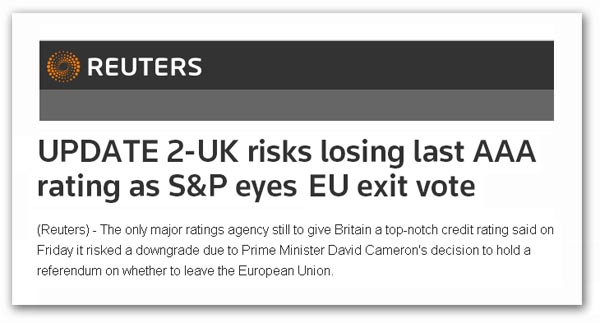13/06/2015
The "Big Three" global credit rating agencies â the US based Standard & Poor's (S&P), Moody's, and Fitch Ratings - have come under intense scrutiny in the wake of the global financial crisis, writes the
Council on Foreign Relations.
Meant to provide investors with reliable information on the riskiness of various kinds of debt, these agencies have instead been accused of exacerbating the financial crisis and defrauding investors by offering overly favourable evaluations of insolvent financial institutions and approving extremely risky mortgage-related securities.
For this and other reasons, these agencies have come under the increasing grip of
EU regulation, with additional regulation
newly implemented and
further scrutiny on the cards, as the rules bite.
It may, therefore, not be entirely a coincidence that Standard & Poor's
has lowered the outlook for Britain's triple-A rating to negative from stable, saying that it risked a downgrade because of David Cameron's decision to hold an EU referendum.
The vote, says the agency, "represents a risk to growth prospects for the UK's financial services and export sectors, as well as the wider economy". And if Britain looked likely to leave the EU, it could cut Britain's rating by more than one notch, while sterling risked losing its status as a global reserve currency.
As well as hurting Britain's economy, leaving the EU would damage Britain's ability to finance its large stock of public debt and its current account deficit, S&P said. "The UK government's decision to hold a referendum ⦠indicates that economic policy-making could be at risk of being more exposed to party politics than we had previously anticipated", the agency added.
From any dispassionate view, however, this is an unduly pessimistic assessment. With the referendum unlikely to be held for another two years, and probably at least three years before the UK would be near quitting â just supposing the "no" campaign succeeded â there is plenty of time to take the economic temperature, on the basis or real evidence.
This move, therefore, has the hallmark of a politically-motivated intervention and, with the power the EU holds over the credit rating agencies, it doesn't take much to guess why. The craven servant is bowing to its master.
And so the FUD goes on and on. There is no relief in hand, and much more to come. But that is all it is: fear, uncertainty and doubt. The purveyors of fear have no reasoned case, so they turn to the only thing they have. But that weakness shows how strong we really are.

